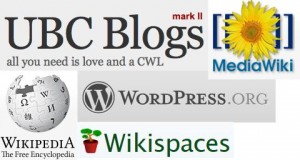
My musings on blogging:
Upon reflection of setting up my UBC WordPress blog, I can definitely say that I’m beginning to master the brief learning curve and getting accustomed to the features that WordPress blogs has to offer. I think it also helped that I’ve used Google’s Blogger before and I definitely appreciate the use of this platform for my ongoing reflections on my learning journey throughout this course. One of the aspects I am still working on is sprucing up my html skills as at times I’ve had to revise and re-edit my posts as the html code hasn’t been visually perfect. In any case, I do find it useful to switch easily from html to visual views so that I can gauge how the html will affect the appearance of my post.
With the proliferation of blogs ranging from personal to professional in nature, it’s clear how functional and useful these can be as it can inform one’s learning and also obtain different opinions on a variety of topics. As the e-learning toolkit cited blogging, particularly educational blogging is indeed becoming increasingly popular. To keep up with them it does help to have them all on RSS feeds using products like Google Reader to organize and track all the information available. There are several professional blogs that I follow including David Rothman, Krafty Librarian, Jessamyn West’s librarian.net, Dean Giustini’s The Search Principle- among others as I find them particularly informative to help me stay current with the latest trends occurring in the field of librarianship.
As a notable mention, I recently stumbled upon a paper by my previous course instructor Dr. Diane Janes on blogging. It offered practical insight into how blogs can be incorporated in a constructivist classroom. Here’s a link to the paper for further reading: http://www.jdwwebdesign.com/edutech/pdfs/Blogs-Constructivist.pdf
Wikis:
Exploring the world of wikis was first examined in my LIS 766 Intro to Health Sciences Librarianship course at the University of Western Ontario. Out of curiosity, I re-visited my course wiki site at: http://healthresearchguides.wikispaces.com/ and surprisingly the Dentistry subject page I created was revised by a former classmate back in ’07. Further to this experience working on a wiki page, I recall that last term in ETEC 510 Design of Technology-Supported Learning Environments one of the pages I created was on Motivational Theories and Design at: http://sites.wiki.ubc.ca/etec510/Motivational_Theories_and_Design. As there was a bit of a hiatus since ’07 to ’11 that I had experienced working on wikis I remember consulting the various help pages from Wikipedia and gathering resources to create my wiki entry as citing verifiable sources was imperative to ensure its accuracy. It was quite an intensive research process and a definitely worthwhile experience to learn to use the “wiki language.” In the end, I don’t think I realized the full potential of working on a wiki as I didn’t chose to edit another person’s existing entry and instead I created my own. I recall that other students in the class also expressed the fact that perhaps MET students may be “too polite” to edit another students’ work. Unlike Wikipedia’s infamous edit wars, I felt that the process of working on a wiki entry using MediaWiki was pretty diplomatic and straightforward.
Looking now to my most recent experience with actually editing pages and engaging in the discussion “talk” portion of this week’s wiki activity I have to say it was a bit challenging to keep up-to-date with all the conversation that was occurring. I imagine that with more than 20+ students working on a wiki entry (say for example Wikipedia which is publicly accessible and can be edited by anyone) it can probably become even more challenging to keep content organized and maintain its accuracy. Yet, there are definitely benefits to using wikis as information is forever changing and certainly the features of a wiki enables this dynamic content to be created, edited and continually discussed. At the same time, it is dependent on its active contribution (to maintain its currency). Thus, some of the content from my health sciences course wiki may be outdated as I noticed from the history tab that it was last revised in ’07. Since that time, links may have changed, and more recent information about topics are probably available. In contrast, I imagine that the ETEC 510 Design Wiki will continue to be active as new rounds of MET students create new entries and revisions causing iterations of the course wiki to unfold.
Also, another notable mention related to the world of wikis is the HLWIKI- which is chock-full of information on the health sciences library field (geared for health librarians but accessible to anyone) available at: http://hlwiki.slais.ubc.ca/index.php/UBC_HealthLib-Wiki_-_A_Knowledge-Base_for_Health_Librarians.
References
Beasley-Murray, J. (2009). User:Jbmurray/madness. Retrieved from http://en.wikipedia.org/wiki/User:Jbmurray/Madness
Guistini, D. (2011). HLWIKI. Retrieved from http://hlwiki.slais.ubc.ca/index.php/UBC_HealthLib-Wiki_-_A_Knowledge-Base_for_Health_Librarians
Janes, D. (n.d.). Weaving blogs into a constructivist classroom. Retrieved from http://www.jdwwebdesign.com/edutech/pdfs/Blogs-Constructivist.pdf
MediaWiki. (2011). ETEC 510: Design wiki. Retrieved from http://sites.wiki.ubc.ca/etec510/Main_Page
Wikipedia (2011). WikiProject murder, madness and mayhem. Retrieved from http://en.wikipedia.org/wiki/Wikipedia:WikiProject_Murder_Madness_and_Mayhem
Wikispaces. (2007). Health research guides. Retrieved from ttp://healthresearchguides.wikispaces.com/
One reply on “E-learning toolkit: The wonderful world of weblogs and wikis”
I think using the wiki this week was worthwhile in pedagogical terms, but I will still use a threaded discussion forum rather than a wiki 90% of the time. The other 10% would be for where bandwidth issues are significant (like Lenora back in Module 2).
I feel wiki discussions aren’t as iterative–or as rich.